HOMELESS IN THE BIG CITY
Christmas lunch 2021 with the rough sleepers of Delta Park and surrounds
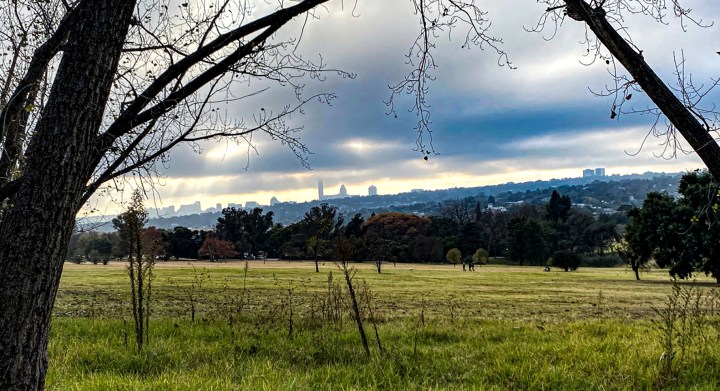
With an economy crunched by Covid and government, the numbers of unemployed and marginalised in South Africa have shot through the roof. The situation has led to an increase in people living on the streets and in the country’s parks, a mix of economic migrants, from across both national and provincial borders. Johannesburg, as ever, since gold was discovered in the reefs surrounding the city, is the magnet, although this time the ‘gold’ constitutes not much more than a recycling trolley or a piece of pavement.
I was surprised to see Christopher Chisanga serving Christmas lunch to the homeless at a small church in the established Johannesburg suburb of Parkview. Surprised because I’d seen him lining up for communion many times in my two years back in Johannesburg. He was always wearing the same tweed-looking jacket, with hair dyed slightly orange, I’d even seen him seated in the pew in the far left-hand corner of the church, operating the laptop that facilitated the online service to the St Francis of Assisi parishioners. I was never quite sure how he fitted in.
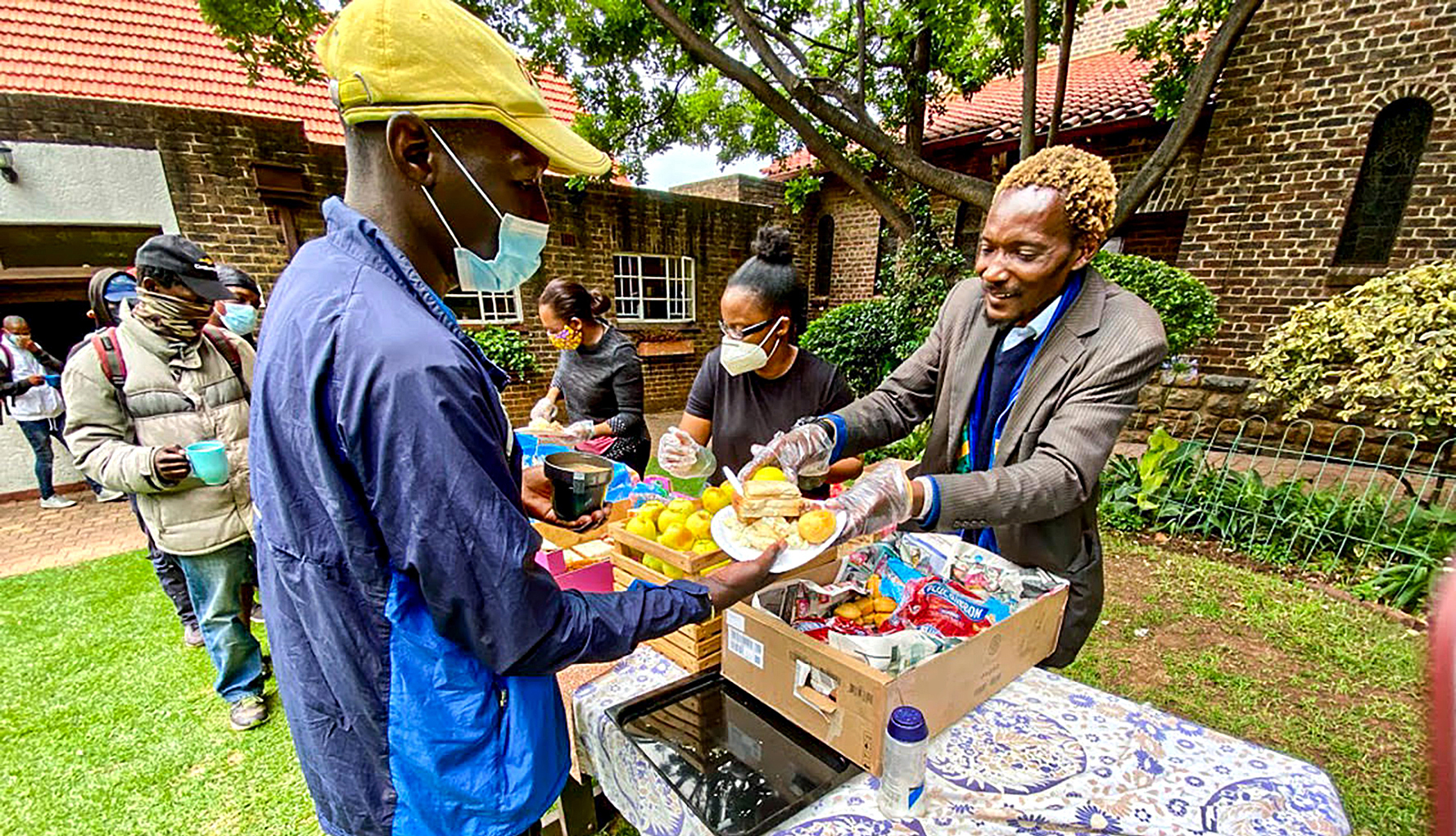
Christopher Chisanga and Esther Karimi Malia (at the bottom of the table) serve lunch on a regular Sunday at St Francis, Parkview, Johannesburg. (Photo: Angus Begg)
Esther Karimi Malia, originally of Nairobi, and a longtime parishioner who has been running the weekly St Francis feeding scheme for the past two years, said Christopher “has been around” since she worked in St Francis’s registry office in 2007.
“We had few volunteers that day”, said Karimi Malia, referring to the Christmas lunch, so she asked Christopher to assist. It was the first time he had assisted, she said, in the two years she had been running the project, adding that he said he was an ‘IT specialist’ (which explains why he’d been assisting with the online service broadcast.)
She said one of the congregation had got him a job with a well-known IT solutions company, and she thinks he resigned. She said a local girls’ high school employed him in security, but that seemingly didn’t work out either. Christopher said he was now “recycling”, I’m not sure if he has a home.
Delta Park #1
Johannesburg’s Delta Park, set in the leafy northern suburbs, a few kilometres from St Francis, is home to many people, for whom, for whatever reason, life didn’t work out. Those I engaged with seem to have had homes somewhere-out-there, within and beyond our borders, to which — for reasons largely economic — they are unable to return to. 6am at the tap outside the public toilets next to the park’s Environmental Centre is a good time to meet these rough sleepers. I met a gent from East London, filling his bucket. We chat over a flask of tea. He says he keeps returning to the Delta Park suburbs — where he says he was employed as a gardener until the owners left — in the hope of finding work.
In a bitter midwinter’s cold, he was sleeping near a stream, alone, in a forested part of the park, sadness pulling down at the corners of his eyes. I cannot remember his name. It’s easy to forget the names of the invisible amongst us.
A younger man from the Mooi River area of KwaZulu-Natal arrived with his bucket, “from the pavement”, he said, outside a DIY franchise in the near northern suburb of Craighall. He performed his ablutions in the public bathroom, washed his clothes and hung them to dry over the wall of a long-abandoned nearby reservoir covered in graffiti. Maybe his name was Craig. Hope remained in his young expression.
The gent from East London said he knows it’s colder sleeping next to water, but that he feels safer in the trees. I could’ve asked why he did not sleep with a group who bed down among some poplar trees about a kilometre further up the park, but he would have a reason, just like we have reasons for choosing our own friends. That alone, that ability to reason and distinguish, identifies him as a human, with the same vulnerabilities and frailties that we all have, except without the resources to deal with them.
‘They’ people
Their similar-predicament brethren are the rough sleepers outside Delta park, who sleep on pavements near shops in suburbs like Linden — ‘waste-pickers’, aka recyclers. They collect recyclable junk around the city, filling their large bags on trolleys in the suburbs, before hauling their cumbersome loads — sometimes joining traffic queues — to recycling depots maybe five to ten kilometres away.
Pitso, James and Lesedi are some of the ‘they’ people. From Zimbabwe, Durban and Botswana, they have life stories of their own. On a warm Christmas Eve early morning, happy respite from the rain of La Nina, it is challenging to enter their space, to give an ear to their lives.
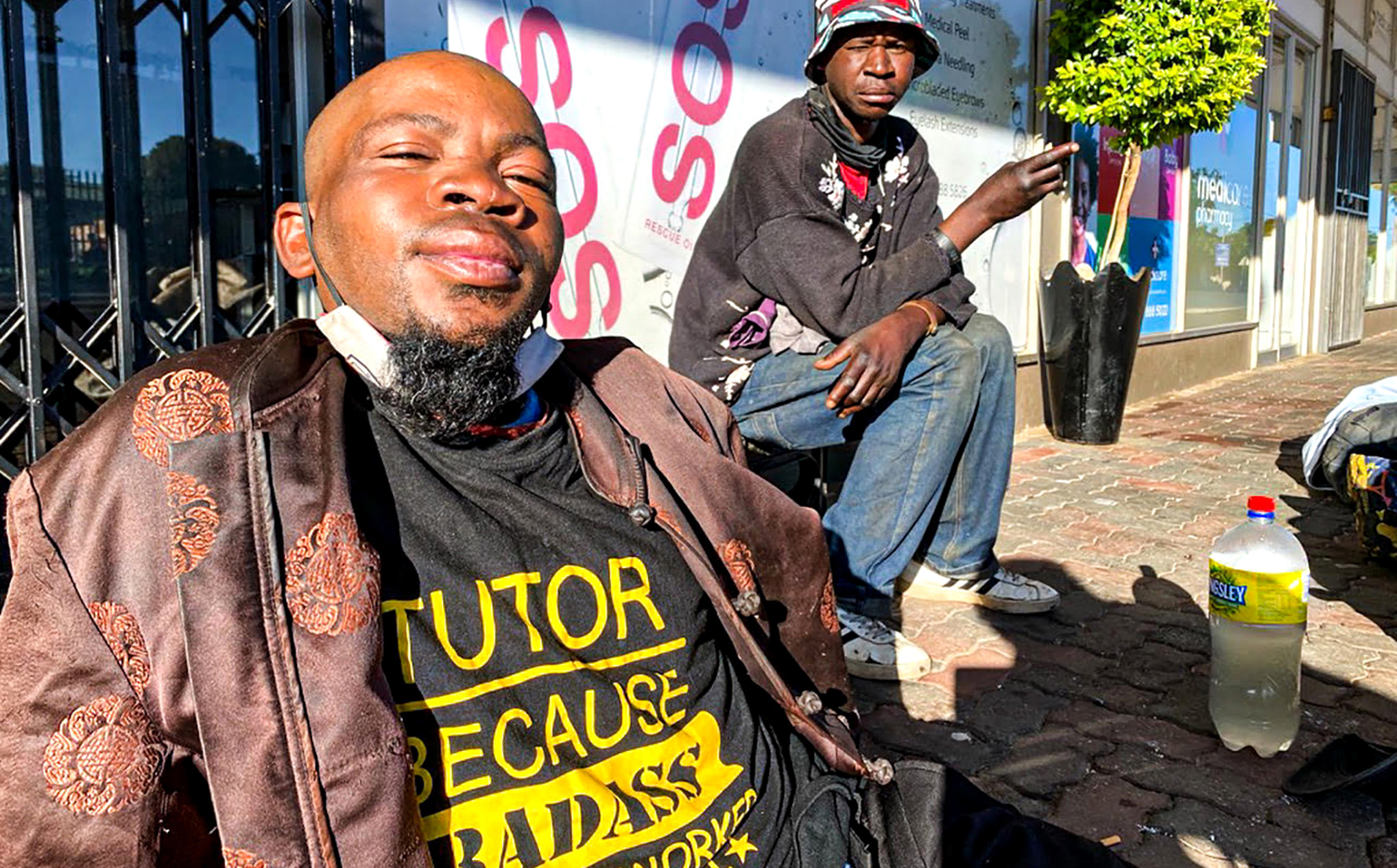
Front, Lesedi from Botswana, and Pitso from Zimbabwe, on their Linden pavement, Johannesburg. (Photo: Angus Begg)
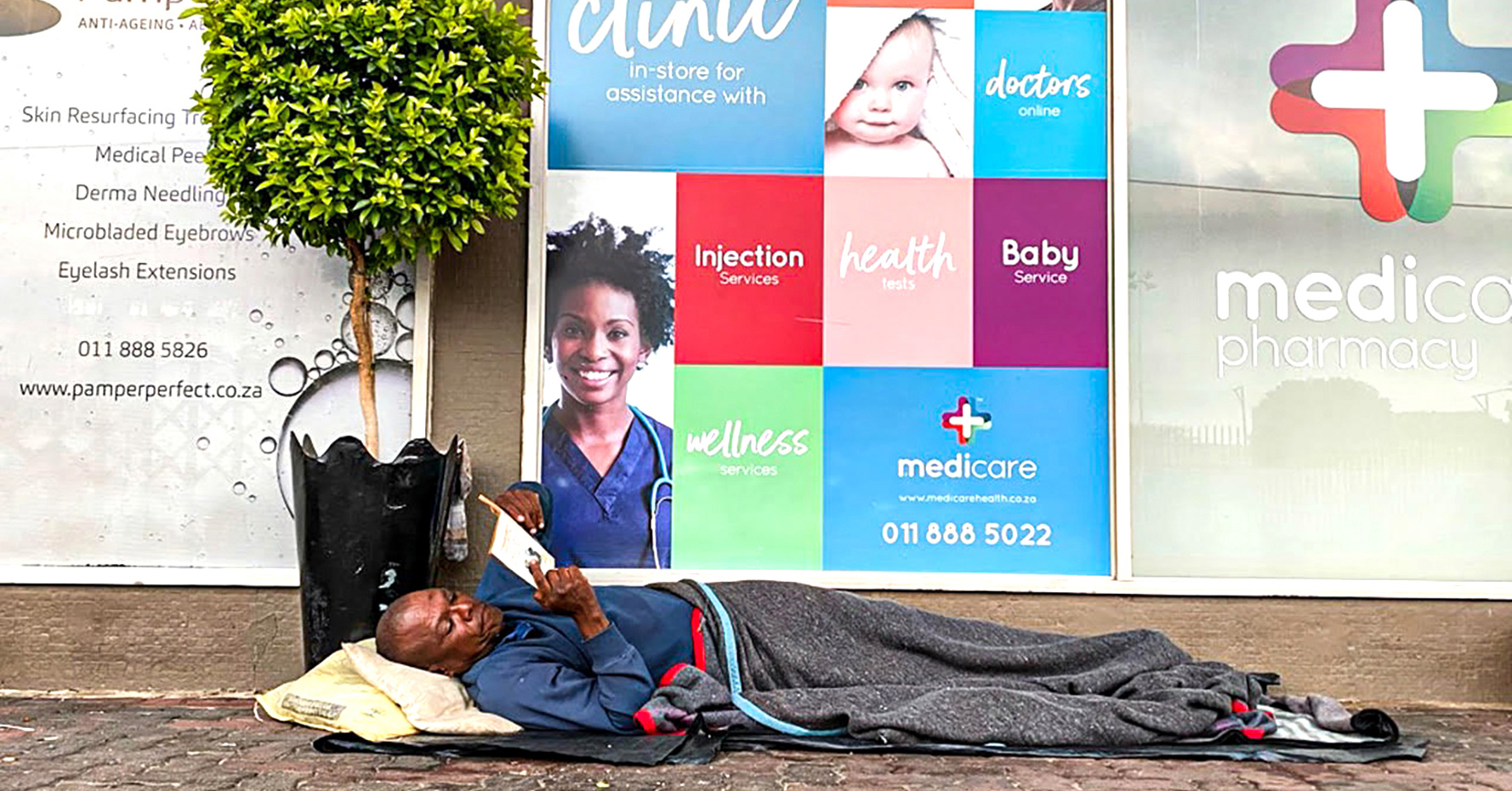
James, from Durban, reading on a pavement in Linden, Johannesburg, partner to Pitso and Lesedi, says he prefers reading to drinking. He had done a gardening job the day before. (Photo: Angus Begg)
Pitso is seated on his beer crate (they can identify fellow rough sleepers from a distance by the colour of the crate they sit on) and Lesedi is in an alcohol-fuelled haze, moving between sitting and lying on the pavement. The average observer would identify them correctly as being plastered.
They were still drunk at the end of the day, a kilometre down the road, opposite a pizzeria struggling to find patrons — I think it’s because of too much cheese, no oregano on their pizzas — as the celebration of Christ’s birth approached.
Pitso could not remember his surname. James lay back, head resting on a makeshift pillow, reading his book, a Louis L’Amour western. I learnt some time back that some rough-sleepers drink to forget their circumstances, while in winter there is the added incentive of white spirits warming the gut, and facilitating a 0°C (freezing point) slip into slumber, on a pavement on a frantically busy road at the crest of a Randburg hill.
The tribulations of January Tele
A few kilometres away, back on St Francis’s gently undulating lawn in Parkview, under a warm sun and an oak tree maybe 100 years old, January Tele and his delicate 10-year-old daughter Patience are being served Christmas lunch by Christopher, Esther and a team of volunteer parishioners who every week feed a long, growing queue of homeless and rough sleepers.
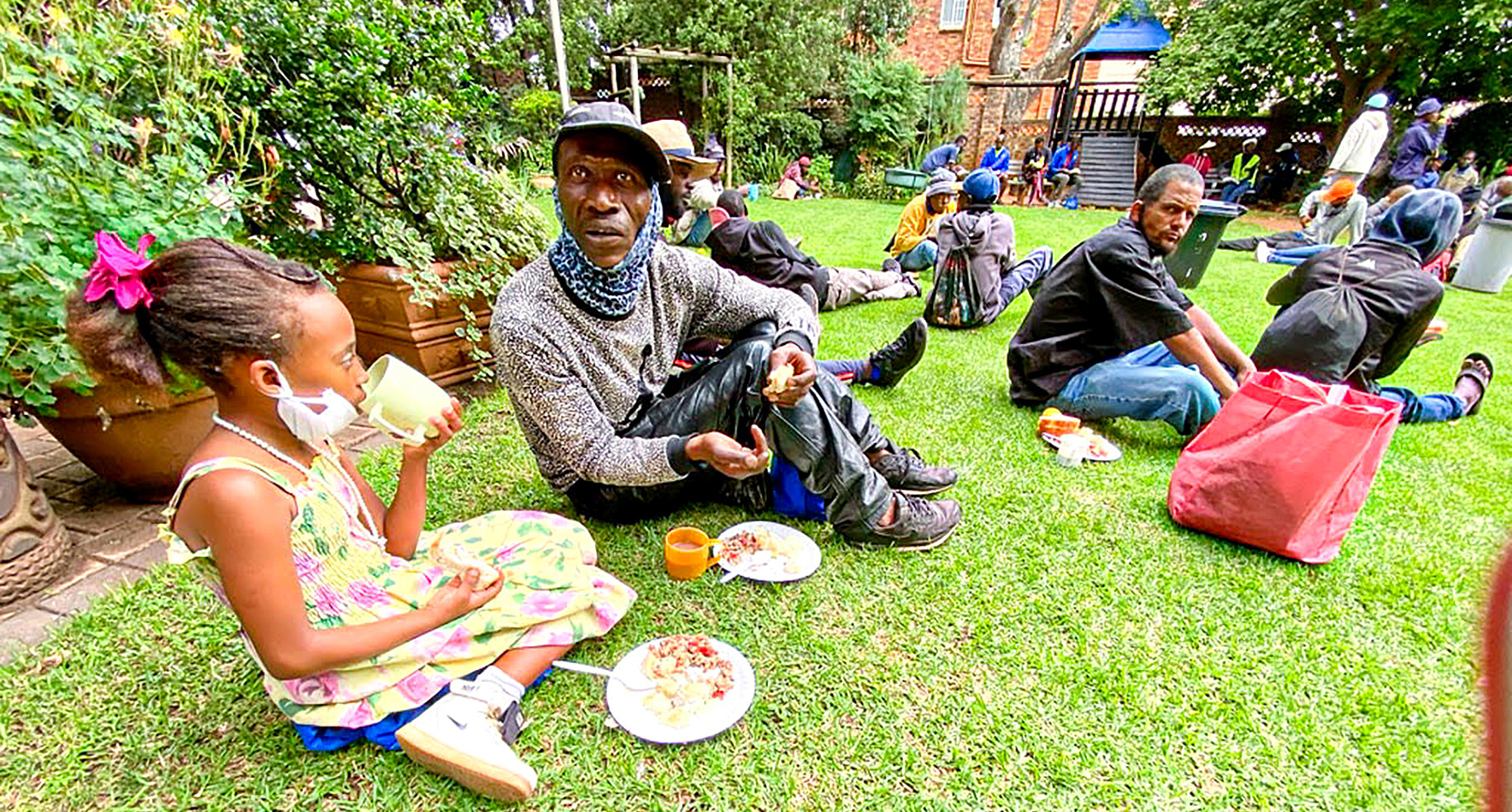
January and Patience Tele trek from Vrededorp to St Francis for weekend lunches, Parkview, Johannesburg. (Photo: Angus Begg)
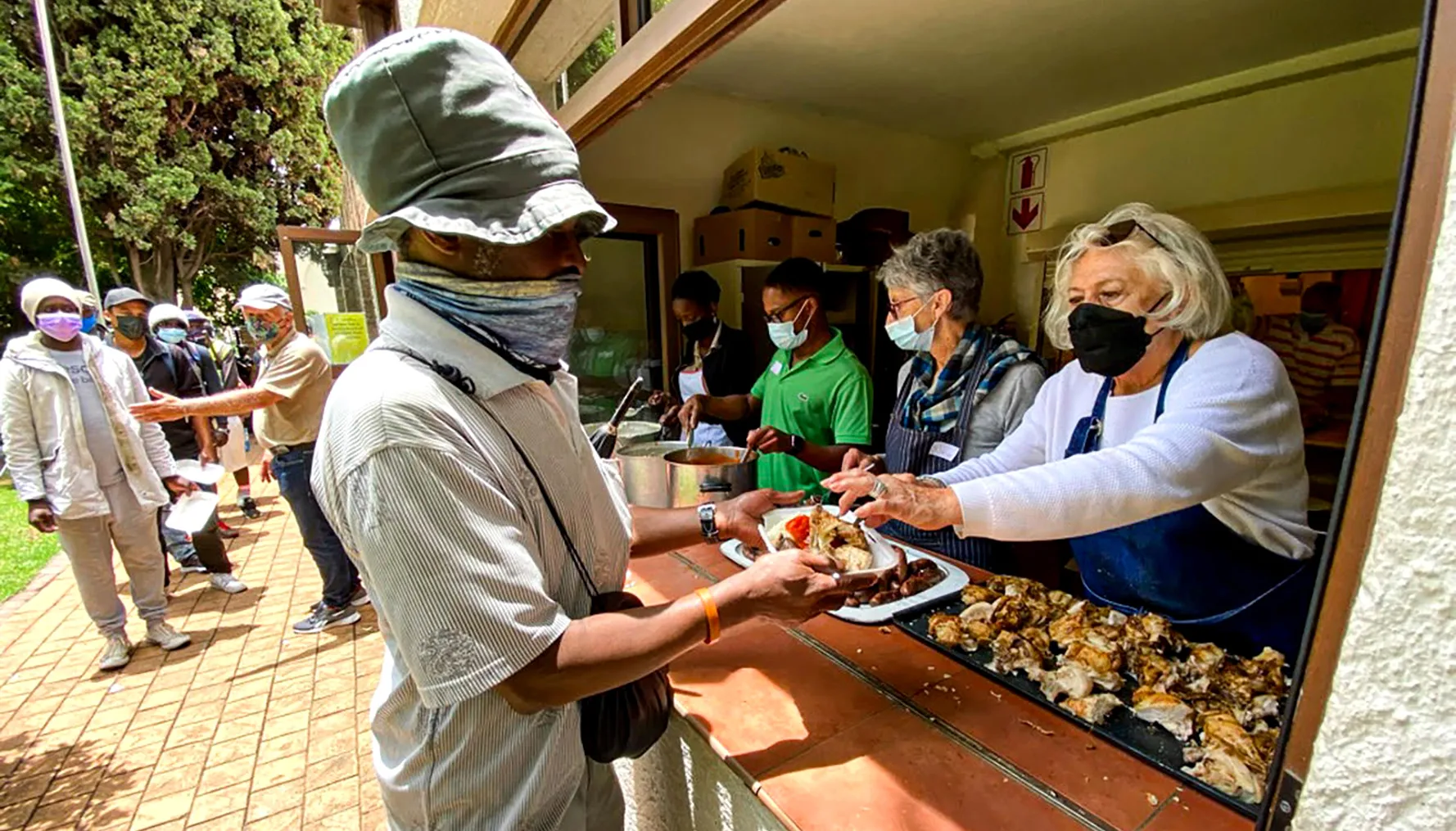
St Francis parishioners serving up Christmas lunch, Parkview, Johannesburg. (Photo: Angus Begg)
January says he is a security guard in Brixton. With Patience, he lives in a semi-detached house in Vrededorp, which sounds like a type of commune. It’s safe he says, with other children also living at the address, friends for his Patience. For the Teles, it is a roughly 7km walk to St Francis for this meal. The security guard says he earns R2,700 per month. With his rent costing R2,000 per month, that leaves R700 for food, Patience’s school and everything else.
Overly familiar with the justice department’s arguably biased approach to fathers’ rights in parenting and care and contact issues, I wonder aloud why January is allowed to parent his daughter. He says her mother “went off with another man”. Maybe the social grant and sympathy that comes with having a child is what he wanted. Maybe he is just a devoted dad doing his best for his girl. January has a pleading, almost manic look in his eyes as he tells me his story, with his pretty daughter, in what I imagine to be her Sunday finest, eating quietly alongside. The lawn around us is sprinkled with similar tales, some dressed in rags and others wearing shirts with names of beaches, global cities and English football clubs they almost certainly have never visited.
I think of my conversation with a waiter on my first visit to a coffee shop in Johannesburg’s Hyde Park centre. I asked if anyone actually bought the R5,000 bottles of champagne. He said yes, just yesterday a table of girls — ‘children of tenderpreneurs’, he said with a wink — had bought five.
Back at the Christmas lunch, January’s biggest wish — he doesn’t ask for it, as such — seems to be a school uniform for Patience. I mention that my nine-year-old daughter is no longer with me and that I will bring some of her clothes (worn maybe every second weekend for a few months) books and puzzles for Patience to the next lunch.
When I deliver the goods, trying in vain to hide the delivery from the others in the food queue, he reaches into his bag and produces a social worker’s report and Patience’s academic report. I didn’t see it at first, but here was a man with hope and desperation stencilled behind his eyes, praying for a benefactor. January is not a rough sleeper, as we speak pushing his pride between the remaining bits of rice and veg around his plate, yet from many conversations with others living on societies’ fraying edges, I know he and Patience could be a day or two away from their own pavement or shelter.
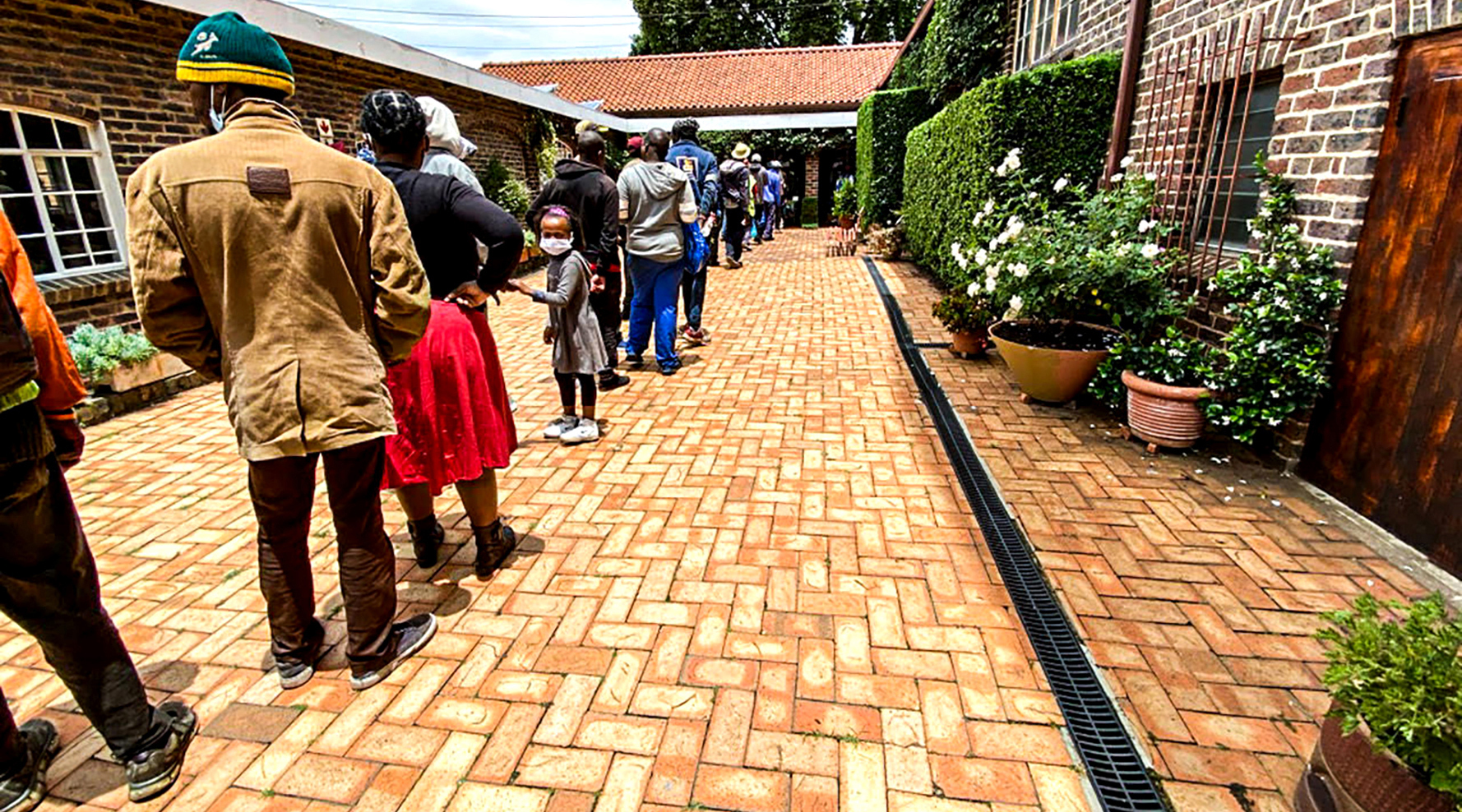
Patience Tele with her father, January, in the St Francis Christmas lunch queue, Parkview, Johannesburg. (Photo: Angus Begg)
Nomadland
The challenge of being literally homeless, especially with a child — on top of being jobless — for most of us is probably unthinkable. Speaking to councillors, a Community Police Forum, the city of Johannesburg and soup-kitchen providers at various times over the past six months in connection with a mediation exercise I was involved in (investigating a solution to the rough sleepers in Delta Park) it is clear that society was siloed into opposing corners; the ‘they’ and ‘not in our backyard’ versus the caring and compassionate.
Christopher Chisanga, orange-haired and blazered and handing out bread to those who live on the streets, has been on the receiving end of compassion. For me, he has come to represent that thin line separating those who live on the edge of rootlessness — who cannot function effectively within conventional society — from those who literally have nowhere ‘safe’ to go to. It’s hard to establish why, as seems to be the case, he struggles to hold onto a job (in our last conversation he said he was “recycling”). In contrast, it’s easy to draw our own conclusions about people who do not live as we do, and much easier to judge them.
Rough Sleepers
‘Rough sleepers’ a term that I learnt, while on an international peacekeeping and mediation course, is ‘a thing’ in the United States. Illustrated profoundly by Frances McDormand in the movie Nomadland, it speaks to a sector of society unable to keep financial pace with the rest of the country, unable to afford a conventional home of four walls and a roof. With their lives pared down to the bare essentials, they hit the road, en route to an extremely brave new world, be it a succession of proverbial trailer parks, or a park. The factor that distinguishes those less fortunate Americans from their African brethren here in Johannesburg is that they will usually have had a regular job, an income, before falling on rough and stony times on a cardboard sheet. People like Christopher. The former IT worker and high school security guard may not be living rough in Delta Park, but he is probably without a fixed abode, like those in the park. His situation, however, and that of the over 100 rough sleepers being served their Christmas lunch at St Francis, is not unique to South Africa’s cities.
Delta Park, USA
A 210-hectare public municipal complex called Delta Park in Portland, the state capital of Oregon, USA is home to hundreds of ‘rough sleepers’ — aka campers — in several camps around the park, most of whom have also landed on that part of their butt called hard times.
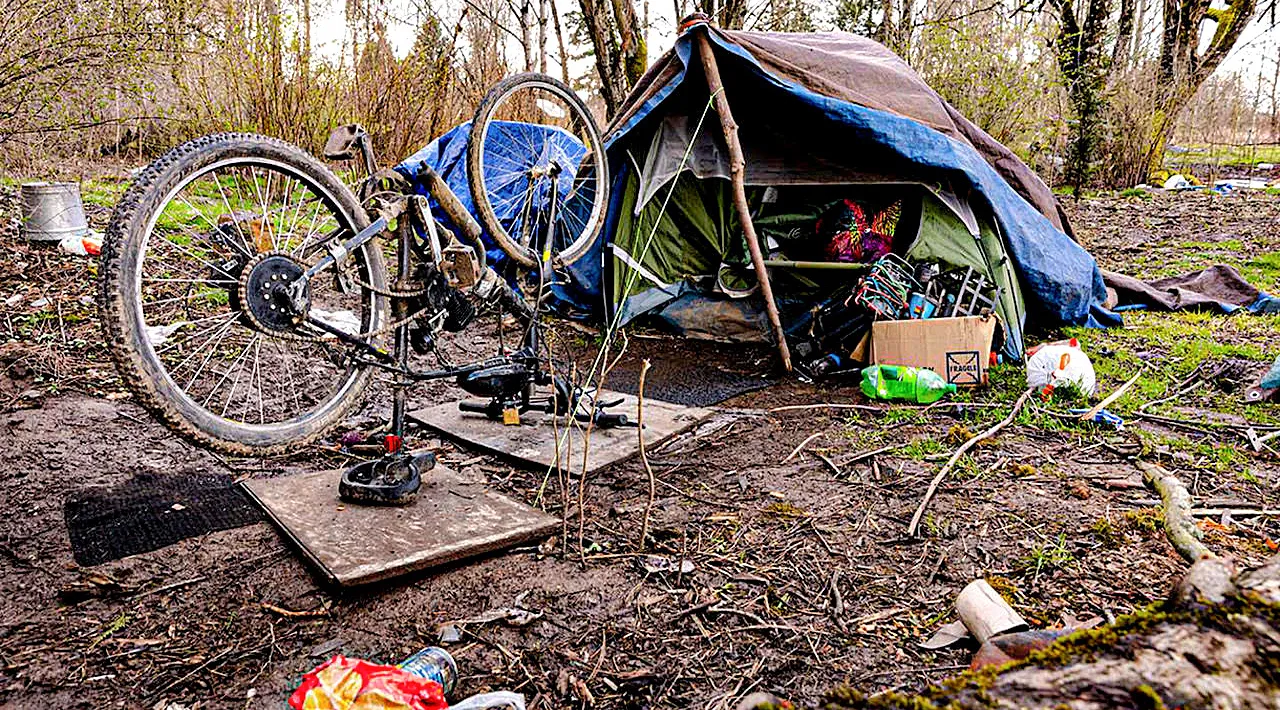
Delta Park, in Portland, US, is home to a few camps set up by rough sleepers, aka ‘campers, who have fallen on hard times. (Photo: Supplied)
“Portland is nearly as divided on homeless camping”, read an article in the Portland Mercury, “as it is united in its belief that verdant, fir-dappled parks are a civic crown jewel.” Human waste, hypodermic needles, tents blocking paths and pavements — and various crimes — are some of the complaints raised by residents surrounding this part of the Portland park, much of which is a protected nature sanctuary.
Local TV station KGW8 captures the situation faced by rough-sleepers and residents: Portland to remove homeless camps more aggressively. The article speaks of “the city’s repeated failure to address a housing and addiction crisis” (a claim that wouldn’t be entirely out of place in Joburg’s Delta Park). This is in a country, albeit massively in debt, where most people pay tax, where important local debates are engaged in and where enforcement is available when the constitution is broken. The concerns and accusations in Portland media could (bar the hypodermic needles) just as well originate from Blairgowrie or Victory Park, two suburbs bordering the Johannesburg Delta Park. Except that the issue here — a growing urban human, health and possibly conservation predicament deserving of urgent concern — rarely, if ever, reaches mainstream media.
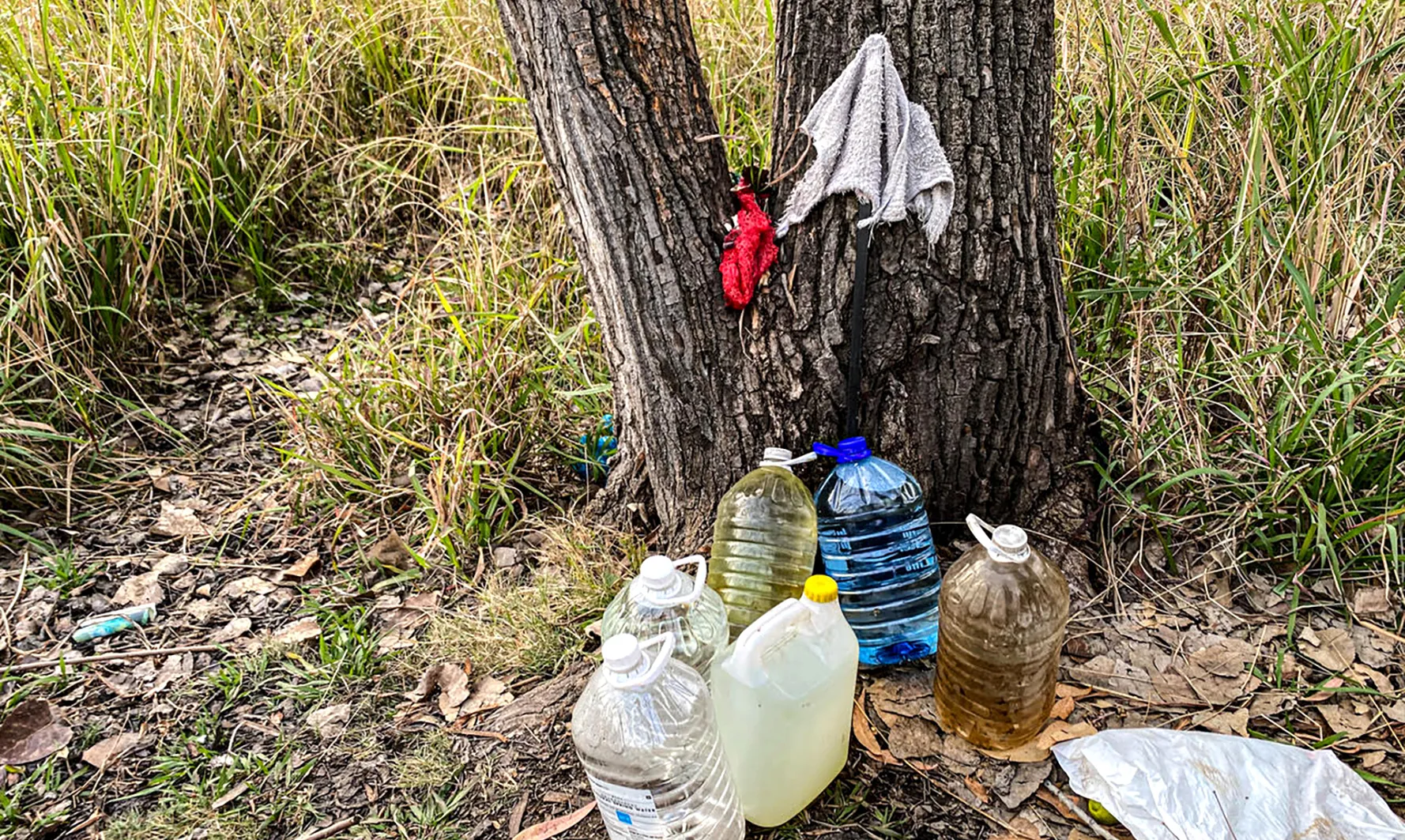
One of the Delta Park, Johannesburg homeless dens. Paint tins, out of picture, serve as seats, with a pen and notebook wedged into the bark. (Photo: Angus Begg)
The stark difference between the two Delta Parks is our utter lack of interest or concern. Local and national government leaders close one collective eye while choosing their luxury company car with the other, while most of us try not to see them, in case our conscience is called upon to engage. Churches, NGOs and citizens fill the gaps in between by providing weekly meals.
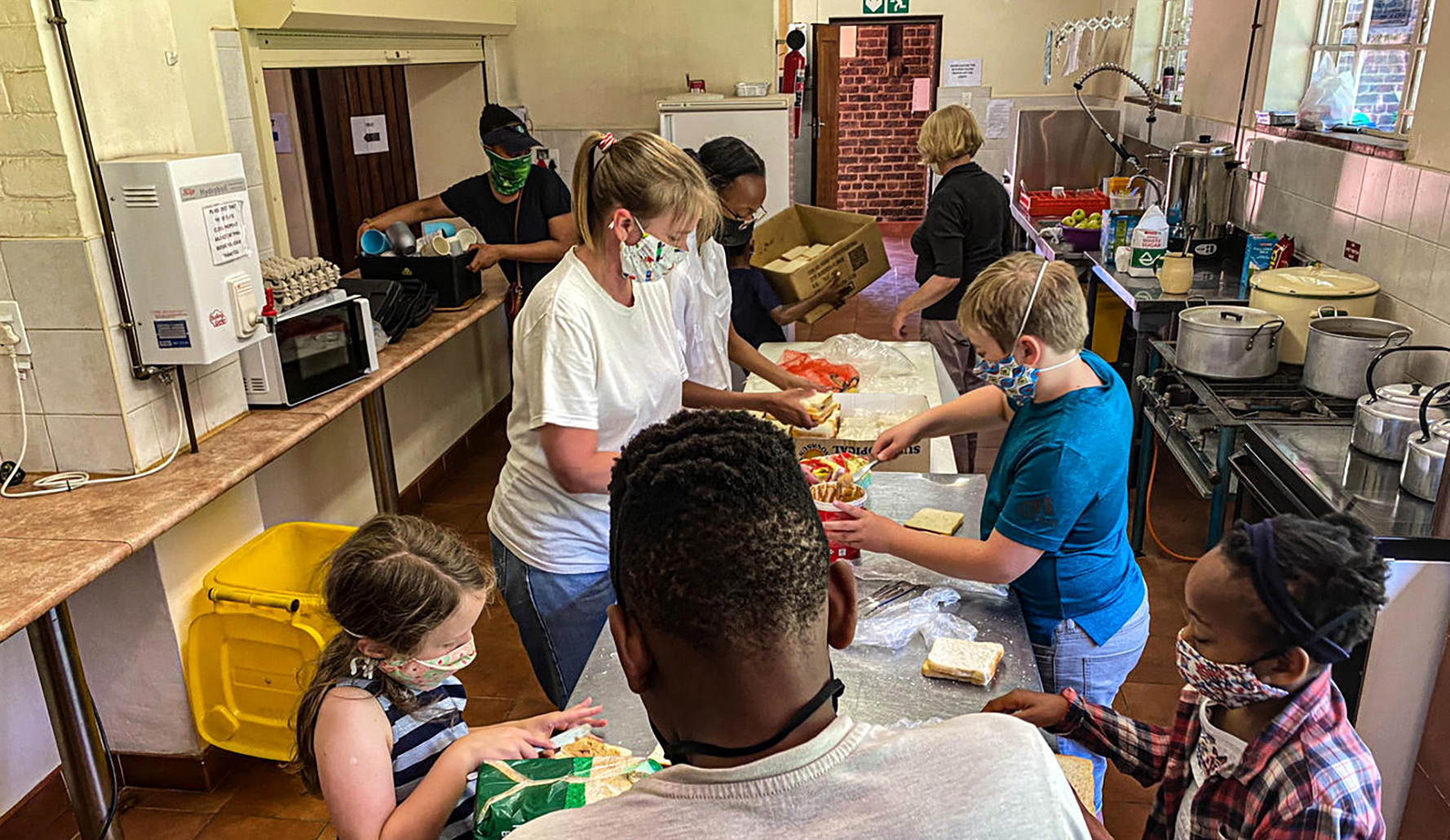
Fellowship and care for the community are generated among all ages at St Francis, Parkview, Johannesburg. (Photo: Angus Begg)
Happy Holidays
One early morning, the weekend after Joburgers began seriously streaming to the coast for their December holidays, when the road was quiet and his pavement almost empty, Lesedi broke down in tears, saying his parents and brother had died in a car accident and it was his fault. “Don’t cry”, said Pitso, “be a man.” Psychologists and social workers will confirm that many veteran homeless people in South Africa will be suffering from some form of mental illness. Maybe Lesedi is suffering from post-traumatic stress syndrome. But if society refuses to ‘see’ him, to recognise his existence like so many of the street folk, how can he and they be helped.
Where will Lesedi and Christopher be for Christmas lunch in 2022?
With a new collaborative administration in place in Johannesburg, and councillors having pleaded for votes in the recent municipal elections, it’ll be telling to see how the matter of those without homes is dealt with, and whether the queues outside St Francis will get longer or shorter. DM/MC




















 Become an Insider
Become an Insider
Oy yo yo yo yo. Throw up all the world’s troubles in the air and then pray you catch your own, as my darling often says. Well written sir.